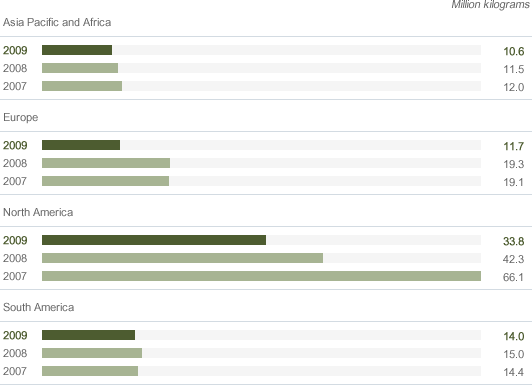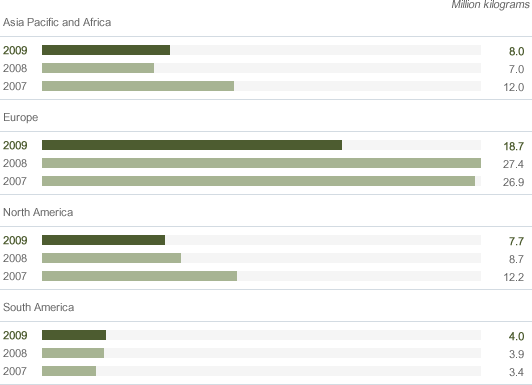Toolbox
Waste
Data On This Page
A. Regional Waste to Landfill

| 2007 | 2008 | 2009 | |
|---|---|---|---|
| Asia Pacific and Africa | 13.5 | 11.5 | 10.6 |
| Europe | 19.1 | 19.3 | 11.7 |
| North America | 66.1 | 42.3 | 33.8 |
| South America | 14.4 | 15.0 | 14.0 |
The data for 2007 and 2008 have been corrected. Also, AutoAlliance International, our joint-venture plant in Flat Rock, Michigan that produces the Ford Mustang, is included for 2009.
In 2009, we reduced total waste to landfill by 20.5 percent compared to 2008. We reduced waste to landfill in all regions except for Asia Pacific and Africa. The slight increase in that region is due mainly to an increase in production. In North America, we reduced waste to landfill by 40 percent.
We decreased waste to landfill primarily through aggressive efforts to generate less waste and recycle more, and through the use of waste-to-energy incineration facilities.
- Data managed through the Global Emissions Manager database
In This Report:
B. Waste to Landfill Per Vehicle

| 2007 | 2008 | 2009 |
|---|---|---|
| 18.87 | 17.76 | 15.20 |
The data for 2007 and 2008 have been corrected this year. Also, AutoAlliance International, our joint-venture plant in Flat Rock, Michigan that produces the Ford Mustang, is included for 2009.
Total waste to landfill per vehicle continued to decline in 2009. This shows we are reducing total waste regardless of production levels, and therefore using resources more efficiently.
We decreased waste to landfill primarily through aggressive efforts to generate less waste and recycle more, and through the use of waste-to-energy incineration facilities.
- Data managed through the Global Emissions Manager database
In This Report:
C. Regional Hazardous Waste Generation

| 2007 | 2008 | 2009 | |
|---|---|---|---|
| Asia Pacific and Africa | 12.0 | 7.0 | 8.0 |
| Europe | 26.9 | 27.4 | 18.7 |
| North America | 12.2 | 8.7 | 7.7 |
| South America | 3.4 | 3.9 | 4.0 |
We reduced the generation of hazardous waste in all regions from 2008 to 2009. In North America and Asia Pacific, this is the third year in a row we have reduced hazardous waste. These reductions are due to material and process changes.
- Data managed through the Global Emissions Manager database
In This Report:
D. Hazardous Waste Generation Per Vehicle

| 2007 | 2008 | 2009 |
|---|---|---|
| 9.1 | 10.0 | 8.3 |
We reduced hazardous waste generation per vehicle from 2008 to 2009. This shows we are reducing hazardous waste regardless of production levels, and therefore using resources more efficiently.
- Data managed through the Global Emissions Manager database